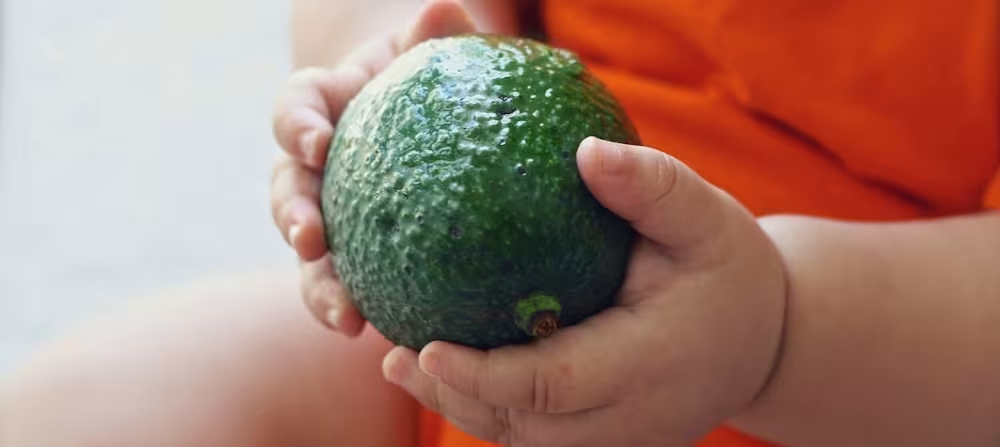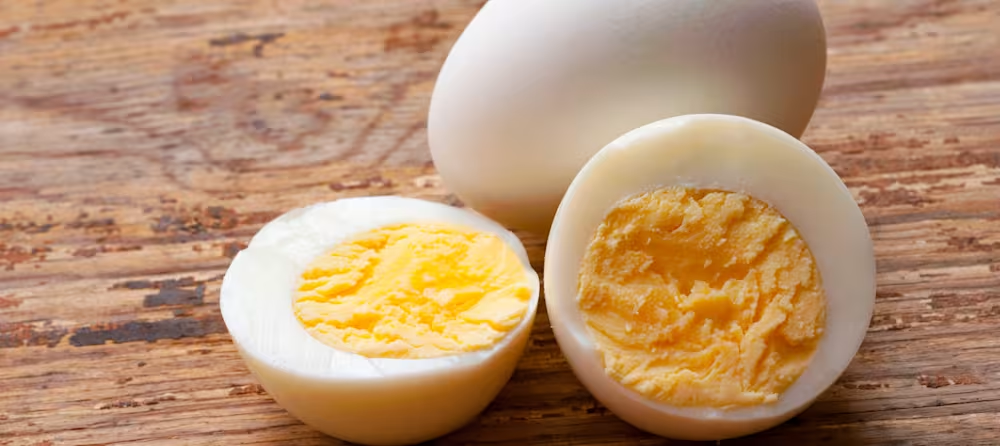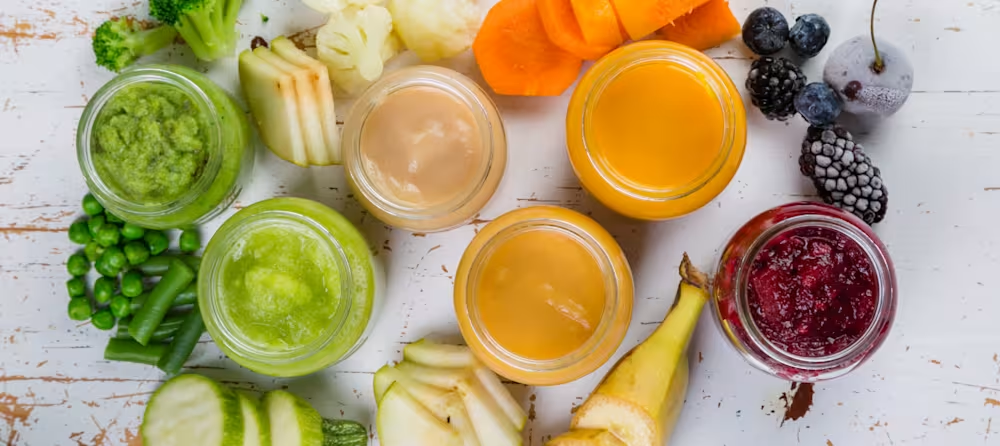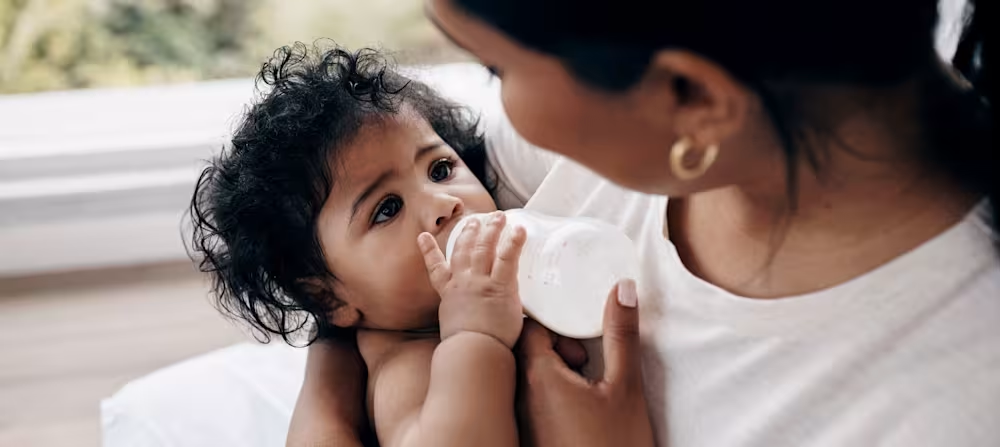When can babies drink water and how to offer it
Updated Dec 10, 2025

Drinking enough water is essential for optimal health and well-being. At birth, babies have the largest percentage of body water, about 78% []. By the time they reach 1 year of age, that number decreases to about 65%.
But what does this mean for babies? Should they be drinking water throughout the day like the rest of us? The answer depends on your baby’s age! In this article, we’ll walk you through when is an appropriate time to offer your baby water, give you info about how much they need, and give you tips for ensuring your little one gets the hydration they need to grow and thrive.
Why is it important for babies to drink water?
Water is important for everyone, including babies, since it has so many vital functions in the body.
Carries nutrients
Lubricates joints
Aids digestion
Regulates body temperature
Water intake recommendations for babies
The American Academy of Pediatrics says babies can be introduced to water in small amounts starting around 6 months [], as breastmilk or formula will remain their main beverage until they reach 1 year. After 12 months, water and are the recommended go-to beverages for kids 1 - 5.
When can I introduce water to my baby?
Babies can begin to have small amounts of water when they start solids at around.
Start by offering a few sips of water from an open cup or straw cup at mealtimes.
Any water your baby drinks at this age is meant to get them used to its taste and introduce the skills needed for cup drinking.
No need to worry if your baby doesn’t like water at first. It's not intended to replace breast milk or formula, which provides all the water your baby needs.
Why can’t babies under 6 months have water?
Babies younger than 6 months should not be offered water or other liquids besides breast milk or formula for a variety of reasons.
Breast milk and/or formula provide sufficient water for newborns and babies up to 6 months old, even on hot days.
Offering water before 6 months may reduce your baby’s intake of breast milk or formula, which are essential sources of hydration, calories, and nutrients at this age.
Introducing water too early or diluting formula or breastmilk with water can be dangerous for your baby because it affects the balance of electrolytes in the blood [] and can lead to seizures.
Can infants drink water?: Risks
Small amounts of water can be given to babies over 6 months. Overall, water is generally considered optional between 6 - 12 months, as breast milk and formula contain sufficient water for infants under 1 year old. If you notice any red flags when it comes to your baby's water consumption, reach out to their healthcare provider for advice. Overhydration is rare and typically associated with watering down formula [].
Signs of overhydration can include []:
Drowsiness
Confusion
Blurred vision
Muscle cramps
Nausea and vomiting
Rapid breathing
How much water should babies drink?
Water needs may vary quite a bit from baby to baby as well as from day to day. Factors such as the weather and activity level can impact hydration needs. Additionally, high water-containing foods such as fruit, vegetables, and soup can also contribute to water intake.
The best way to know if your baby is adequately hydrated is to watch their diapers. Babies should have at least 6 wet diapers a day to indicate they are adequately hydrated. If you aren’t seeing that, watch for other signs of dehydration and talk to your baby’s pediatrician.
Use the table below as a general guide for suggested water amounts, and visit for more expert information from leading health organizations, such as the American Academy of Pediatrics, the Academy of Nutrition and Dietetics, and the American Heart Association.
Suggested water amounts for babies
When do babies need more water?
Most of the time babies will stay adequately hydrated by following the guidelines above. However, there are times when they may need extra water including during hot weather, increased physical activity or illness, especially with vomiting or diarrhea. An easy way to remember these occasions is to think about fluid loss. If your baby is losing water through sweat, vomiting, or diarrhea, it’s generally a good idea to replace it!
For babies younger than 6 months, they will often self-regulate by drinking more breast milk or formula at the next feeding occasion and supplementary water is not needed. For babies older than 6 months, offer water more throughout the day and encourage small sips. Continue to monitor for signs of dehydration and consult your pediatrician with any concerns.
Can babies drink juice or other beverages?
Generally speaking, experts recommend breast milk, formula, plain water, and plain cow’s milk or a nondairy alternative (starting at 12 months) as the primary drinks for babies. These drinks meet baby’s hydration needs without unnecessary ingredients such as added sugars, artificial sweeteners, or caffeine.
Babies 12 months and older may drink 100% juice in small quantities, not exceeding 4 ounces per day. Diluting juice with water is a great way to provide juice and stay within the recommended amounts.
How should I offer water to baby?
What to try | Why it helps | How to put it into practice |
|---|---|---|
Offer small amounts at meals | Helps babies get used to the taste of water without replacing breast milk or formula. | Serve 1 - 2 oz with meals or snacks. Increase slowly as solids and motor skills improve. |
Use a baby-sized cup | Learning to drink from a cup or straw cup supports oral development and long-term skills. | Choose a small, easy-to-hold cup. Start with tiny pours and guide them as needed. |
Count food-based hydration | Fruits, veggies, soups, and popsicles add to fluid intake, even when water intake seems low. | Offer hydrating foods during meals. Remember these contribute to daily fluid totals. |
Make water available after age 1 (12 months) | Once displacing breastmilk and/or formula consumption is no longer a concern, babies can hydrate more freely throughout the day. | Keep water in reach during the day. Remind them they can sip whenever they’re thirsty. |
Find more details below:
At meals and snacks
Start by offering your baby a small quantity of water at meals and snacks. This regular practice helps your baby to get used to the taste of plain water and work on cup-drinking skills. We recommend keeping water to about 1 - 2 ounces at a time, so it doesn’t displace breast milk or formula (and your baby is less likely to end up soaked in their high chair this way). As your little one’s fine motor skills improve and their solids consumption increases, consider offering a little more water at a time.
In a cup
Offering water in a cup helps babies build lifelong skills such as drinking from a cup or straw. Make sure to choose appropriately sized cups — they need to fit into small hands — and don’t be afraid to help them! Start with small amounts of water and work your way up as baby masters drinking from a cup.
Consider foods
Fruits, vegetables, and anything liquid at room temperature, like soup or popsicles, all contribute to your baby’s overall water intake. Sometimes it may feel like your baby isn’t consuming a lot of liquid, but when you also account for their food intake, you may realize they are getting hydration from lots of sources.
In a smoothie or popsicle
Making smoothies or popsicles at home is a fun way to offer water as well as to try new fruits and vegetables. They can be especially useful for babies who need extra calories or nutrients because you can pack a lot in a small amount of volume.
Throughout the day
When your baby turns 1, you can have water available more frequently throughout the day as you won’t need to worry that water consumption is displacing their breast milk or formula consumption. Place a cup out in the kitchen or playroom and let them know they can drink as needed.
When should I introduce a cup?
Babies can begin using a cup at about 6 months when they start to eat. Most feeding experts recommend starting with an open cup or a straw cup as these help to strengthen the muscles used for eating and chewing. Many parents use sippy cups as well. Even with regular practice, babies will continue to develop their cup-drinking skills through to toddlerhood. Expect lots of dribbles and soaked shirts along the way!
How to make water safe for babies
Generally speaking, unless there is a known contamination issue in your water supply, it's not necessary for you to give your baby bottled water exclusively []. However, if your infant is under 2 months and was born premature or with a weakened immune system, your healthcare provider may direct you to boil water before mixing it with your baby's formula. Boiling helps kill harmful microbes and ensures it's as safe as possible for your little one [].
What are signs of dehydration in babies?
Dehydration can be dangerous for a baby and severe cases may require hospitalization. If you suspect your baby might be showing signs of dehydration, it’s best to call your pediatrician right away so they can guide you on what’s best to do.
Note: Conditions such as fever, vomiting, and diarrhea put your baby at increased risk for dehydration.
According to the American Academy of Pediatrics [], the following are signs of dehydration:
Mild to moderate dehydration:
Less activity than usual
Less than six wet diapers a day
Less saliva or cracked lips
Fewer tears when crying
Sunken soft spot on the head
Severe dehydration (all the symptoms listed above, plus):
Very fussy or overly sleepy
Sunken eyes
Cool, discolored hands and feet
Wrinkled skin
Dry tongue and mouth
No tears when crying
Takeaway
Babies under 6 months shouldn't be given water.
You can introduce water to babies in small quantities around 6 months, when starting solids.
Keep in mind that breast milk and/or formula remain a child’s primary sources of calories and hydration until 1 year
After 6 months, water intake recommendations include offering small amounts (1 - 2 oz) at meals, encouraging cup use, considering water-rich foods. Consider having water readily available to your child throughout the day after 12 months.
Signs of dehydration include reduced activity, consistently fewer wet diapers, dry mouth, sunken eyes, fussiness, and more. If you’re concerned about your child’s hydration, reach out to their healthcare provider.
Share article:
Note: The content on this site is for informational purposes only and should not replace medical advice from your doctor, pediatrician, or medical professional. If you have questions or concerns, you should contact a medical professional.
9 Sources
Share article:









